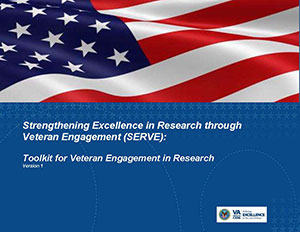
SERVE 2.0 |
The purpose of the Strengthening Excellence in Research through Veteran Engagement (SERVE) Toolkit is to support VA Research Centers and investigators in efforts to include Veterans and other stakeholders in the development, implementation, and dissemination of research studies. The Toolkit was developed through a collaborative process that included representatives from 7 VA hospitals where Veteran Engagement in Research is an established priority.
The goal of the SERVE Toolkit is to provide guidance to VA Research Centers and investigators to support the development of opportunities for Veterans to be engaged in the research that we conduct. There are many approaches to engaging Veterans across VA. The information presented here is a synthesis of a range of successful practices that we learned about during the process of creating this Toolkit.
The Toolkit is comprised of five sections, four of which correspond to a stage of development for Veteran Engagement initiatives and a fifth that focuses specifically on evaluation. The sixth section is web-based and contains a number of useful resources that have either been developed by VA colleagues or that our team identified as being useful for engaged research efforts. Each of the first five sections can be reviewed or downloaded as individual PDFs. You can also choose to download the entire Toolkit (except the web-based resources).
BEDFORD, MACenter for Healthcare Organization & Implementation Research (CHOIR) DENVER, COCenter for Veteran-centric and Value-driven Research (DiSCoVVR) DURHAM, NCCenter for Health Services Research in Primary Care Durham VA Medical Center IOWA CITY, IACenter for Comprehensive Access & Delivery Research and Evaluation (CADRE) |
LOS ANGELES, CACenter for the Study of Healthcare Innovation, Implementation & Policy (CSHIIP) MILWAUKEE, WIClement J Zablocki VA Medical Center NEW ORLEANS, LASouth Central MIRECC & Southeastern Louisiana VA Health Care System PORTLAND, ORCenter to Improve Veteran Involvement in Care (CIVIC) VA Portland Health Care System WEST HAVEN, CTPain Research, Informatics, Multi-morbidities, and Education (PRIME) Center |
Support for this project came from:
VHA Health Services Research & Development, SIP 17-152 (PI: Sarah Ono)
Suggested citation:
Hyde J, Wendleton L, Fehling K, Whittle J, True G, Hamilton A, Gierisch JM, Ertl K, Fix G, Barker A, Wehler CJ, White B, Ritchie MF, Ono SS. Strengthening Excellence in Research through Veteran Engagement (SERVE): Toolkit for Veteran Engagement in Research (Version 1). Veterans Health Administration, Health Services Research and Development, 2018. Available at: https://www.hsrd.research.va.gov/for_researchers/serve/
SERVE 2.0:
Since 2018 when the SERVE toolkit was first published many exciting steps have been made to move Veteran Engagement forward. Centers of Innovation (COINs) around the country have established active Veteran Engagement Groups (VEGs), while national-level research COREs have established topic-specific VEGs to help guide their research agendas. In 2020, the Growing Rural Outreach through Veteran Engagement (GROVE) Center was funded by the Office of Rural Health to promote rural Veteran engagement and to create resources and support for stakeholders working to engage Veterans in multiple areas of research and operations. Through this work new knowledge has been gained related not only to rural Veteran Engagement but also within some of the well-established areas of Veteran Engagement.
We have updated the SERVE toolkit to share what we have learned. Some of the major updates are:
We hope that you find these updates to be helpful and if you have any questions about GROVE or rural outreach, please contact: Kelty Fehling (Kelty.fehling@va.gov) or Leah Wendleton (leah.wendleton@va.gov).
The views expressed in this document are those of the authors and do not represent the views of the U.S. Department of Veterans Affairs or the United States Government.